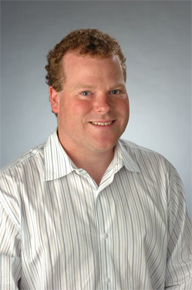
What happens when black holes collide, super novas explode or other violent astrophysical events occur? Syracuse University physicist and noted researcher Duncan Brown will address such questions and discuss a radical new tool that has the potential to unlock the universe's greatest mysteries when he offers a free lecture July 27 at the Nebraska Union.
Brown will present "The New Astronomy of LIGO" at 7:30 p.m. in the Nebraska Union Auditorium. LIGO, short for the Laser Interferometer Gravitational Wave Observatory, is the National Science Foundation-funded instrument designed to make the first detection of gravitational waves — ripples created across space when violent astrophysical events occur. The lecture will provide an overview suitable for all audiences. Anyone is welcome to attend.
Brown's talk will be in conjunction with a workshop that is attracting acclaimed researchers and promising educators in the fields of astronomy and physics to UNL. The Using Astronomy to Teach Physics workshop is July 27-30. The goal of the gathering is to begin developing instructional materials that can incorporate recent astronomical discoveries into undergraduate physics education, said Charles H. Holbrow, emeritus professor of physics at Colgate University, who is organizing the workshop along with Kevin Lee, a UNL research associate professor of physics and astronomy.
"Astronomy and its recent discoveries are enormously interesting and exciting, and they are also, almost without exception, applied physics. They illustrate the principles of physics in deep and interesting ways," Holbrow said. "Can we convert the stories of the astronomers into materials that will induce physics instructors to use them? That's the hope."
The event offers a unique opportunity to bring some of the brightest minds in physics and astronomy to UNL to accomplish something that will have a lasting impact, Lee said.
"It's exciting for UNL to join this effort to transform how physics is taught," he said.
- Jean Ortiz Jones, University Communications